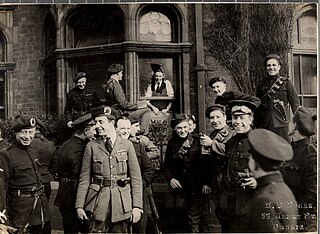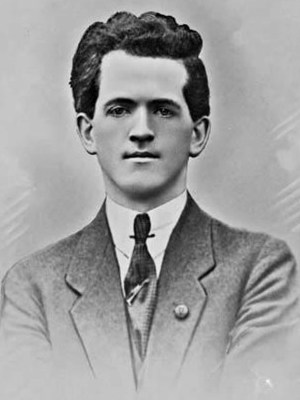Related Research Articles
In the music of Ireland, Irish rebel songs are folk songs which are primarily about the various rebellions against British Crown rule. Songs about prior rebellions are a popular topic of choice among musicians which supported Irish nationalism and republicanism.
The Wolfe Tones are an Irish rebel music band that incorporate Irish traditional music in their songs. Formed in 1963, they take their name from Theobald Wolfe Tone, one of the leaders of the Irish Rebellion of 1798, with the double meaning of a wolf tone – a spurious sound that can affect instruments in the string family of the orchestra.

The Irish Rebellion of 1798 was a popular insurrection against the British Crown in what was then the separate, but subordinate, Kingdom of Ireland. The main organising force was the Society of United Irishmen. First formed in Belfast by Presbyterians opposed to the landed Anglican establishment, the Society, despairing of reform, sought to secure a republic through a revolutionary union with the country's Catholic majority. The grievances of a rack-rented tenantry drove recruitment.

Kevin Gerard Barry was an Irish Republican Army (IRA) soldier and medical student who was executed by the British Government during the Irish War of Independence. He was sentenced to death for his part in an attack upon a British Army supply lorry which resulted in the deaths of three British soldiers.

"Come Out, Ye Black and Tans" is an Irish rebel song, written by Dominic Behan, which criticises and satirises pro-British Irishmen and the actions of the British army in its colonial wars. Its title refers to the Black and Tans, mainly former British Army soldiers, who reinforced the Royal Irish Constabulary (RIC) during the Irish War of Independence and committed many acts of violence and terror against the Irish population. Behan wrote the song as a tribute to his Irish Republican Army (IRA) father Stephen, who had fought in the War of Independence, and is concerned with political divisions in working-class Dublin of the 1920s.
John Kelly lived in the town of Killanne in the parish of Rathnure, west of Enniscorthy, in County Wexford in Ireland, and was a United Irish leader who fought in the Irish Rebellion of 1798. Kelly was obviously well known to rebels and loyalists alike during the short duration of the Wexford Rebellion but very little is known of him outside this time. He was one of the leaders of the rebel victory at the Battle of Three Rocks which led to the capture of Wexford town but was later seriously wounded while leading a rebel column at the Battle of New Ross.
"Give Me Your Hand" is a tune from early 17th century Ireland by Rory Dall O'Cahan. It is one of the most widely recorded pieces of Irish traditional music.

Derek Warfield is an Irish singer, songwriter, historian, and a former member of the musical group The Wolfe Tones.
Patrick Brian Warfield is the vocalist, banjo, harp and bodhrán player and lead songwriter with long-standing Irish band The Wolfe Tones. Brian introduces many of the songs at the Wolfe Tones live concerts and is a keen historian.
"Jim Jones at Botany Bay" is a traditional Australian folk ballad dating from the early 19th-century. The narrator, Jim Jones, is found guilty of poaching and sentenced to transportation to the penal colony of New South Wales. En route, his ship is attacked by pirates, but the crew holds them off. When the narrator remarks that he would rather have joined the pirates or indeed drowned at sea than gone to Botany Bay, Jones is reminded by his captors that any mischief will be met with the whip. In the final verse, Jones describes the daily drudgery and degradation of life as a convict in Australia, and dreams of joining the bushrangers and taking revenge on his floggers.
The Boys of the Old Brigade is an Irish rebel song written by Paddy McGuigan about the Irish Republican Army of the Irish War of Independence (1919-1921), and the anniversary of the 1916 Easter Rising.
"Boolavogue" is an Irish ballad commemorating the campaign of Father John Murphy and his army in County Wexford during the Irish Rebellion of 1798. It was composed by Patrick Joseph McCall in 1898, the centenary of the Rebellion.
"Polly Vaughn" is an Irish folk-song.

Brian O'Higgins, also known as Brian na Banban, was an Irish writer, poet, soldier and politician who was a founding member of Sinn Féin and served as President of the organisation from 1931 to 1933. He was a leading figure within 20th century Irish republicanism and was widely regarded for his literary abilities.

The Restoration of Order in Ireland Act 1920 was an Act of the Parliament of the United Kingdom passed on 9 August 1920 to address the collapse of the British civilian administration in Ireland during the Irish War of Independence.

Patrick Moran was a grocer's assistant, trade unionist and member of the Irish Republican Army executed in Mountjoy Prison along with five other men on 14 March 1921. He is one of those who were dubbed "The Forgotten Ten".

Thomas Whelan was one of six men executed in Mountjoy Prison, Dublin on 14 March 1921. He was 22 years old at the time of his death.
"Foggy Dew" is the name of several Irish ballads, and of an Irish lament. The most popular song of that name chronicles the Easter Rising of 1916, and encourages Irishmen to fight for the cause of Ireland, rather than for the British Empire, as so many young men were doing in World War I.
References
- ↑ "Kevin Barry Biography". Ireland-information.com. Retrieved 3 February 2009.
- ↑ Donal O'Donovan, Kevin Barry and His Time, Glendale, Dublin, 1989. ISBN 0-907606-68-7.
- ↑ "History - 1916 Easter Rising - Rebel Songs (Part 4)". BBC. 1 November 1920. Retrieved 3 February 2009.
- ↑ "The Wolfe Tones (Live) - Kevin Barry". YouTube . Retrieved 2 November 2021.
- ↑ "Paul Robeson sings "Kevin Barry"". YouTube . Retrieved 2 November 2021.
- ↑ "Paul Robeson Songs of Struggle Regis RRC1229 [PG]: Classical CD Reviews". Musicweb-international.com. March 2006. Retrieved 3 February 2009.
- ↑ "Leonard Cohen - Kevin Barry (Shoot me like an Irish soldier)". YouTube . Retrieved 2 November 2021.
- ↑ "This Week in the History of the Irish". Thewildgeese.com. 8 February 1959. Archived from the original on 2 February 2009. Retrieved 3 February 2009.
- ↑ "Kevin Barry". Mysongbook.de. Retrieved 3 February 2009.
- ↑ "Irish Film & TV Research Online". Trinity College Dublin. 27 November 2006. Retrieved 3 February 2009.
- ↑ Since Barry was born in January 1902, he had in fact lived through 19 summers when he was executed. The writer, it is assumed, was alluding to his age of 18 years
- ↑ The suggestion that Barry's torture took place in prison shortly before he was hanged is inaccurate. In fact, the ill treatment took place several weeks before his execution, at the North Dublin Union shortly after his arrest on 20 September 1920.